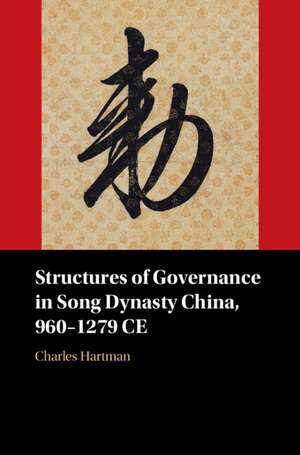Structures of Governance in Song Dynasty China, 960–1279 CE
Autor Charles Hartmanen Limba Engleză Hardback – 5 apr 2023
Preț: 842.39 lei
Preț vechi: 979.52 lei
-14% Nou
Puncte Express: 1264
Preț estimativ în valută:
161.20€ • 168.86$ • 133.59£
161.20€ • 168.86$ • 133.59£
Carte tipărită la comandă
Livrare economică 08-22 aprilie
Preluare comenzi: 021 569.72.76
Specificații
ISBN-13: 9781009235648
ISBN-10: 1009235648
Pagini: 400
Dimensiuni: 152 x 229 x 25 mm
Greutate: 0.79 kg
Editura: Cambridge University Press
Colecția Cambridge University Press
Locul publicării:Cambridge, United Kingdom
ISBN-10: 1009235648
Pagini: 400
Dimensiuni: 152 x 229 x 25 mm
Greutate: 0.79 kg
Editura: Cambridge University Press
Colecția Cambridge University Press
Locul publicării:Cambridge, United Kingdom
Cuprins
List of Figures and Tables; Preface; A Note on the Text; Introduction; Part I: Dual Faces of the Song State; Part II: The Technocratic and Confucian Models of Governance; Part III: Interactions; Appendix; Bibliography; Index.
Recenzii
'In Structures of Governance, Charles Hartman provides a radically new interpretation of Song dynasty political culture. Building on decades of meticulous work in Song historical sources, Hartman argues persuasively that Song governance was not controlled by men who espoused Confucian rule, as the conventional picture would have it, but rather by their political enemies. Hartman brilliantly lays out the mechanisms by which those enemies - palace women, eunuchs, 'petty' technocrats and 'nefarious ministers' - were able to dominate Song political life. The result is a breathtakingly transformed understanding of the functioning of the Song state, one that every student of the Song - and of Chinese history more broadly - will need to take into account.' Beverly Bossler, Brown University
'Hartman has challenged long-held assumptions of Song politics and statecraft, persuasively arguing that technocratic visions and non-literati interest groups counterbalanced Confucian ideologies and scholar-officials. Combining a meticulous autopsy of the evidentiary record with a panoramic survey of institutional dynamics, this lucidly-written and persuasively-argued masterwork will have a revolutionary impact upon the field.' Ari Daniel Levine, University of Georgia
'Structures of Governance peels away the myth of the 'Confucian state' to depict how the Song government was actually structured: as overlapping constellations of monarchical, technocratic, and literati institutions, always in mutual tension and whose relative power was always in flux. It is a stunning achievement that will transform the way we think about Song (and late-imperial) political institutions.' Paul Jakov Smith, Haverford College
'Hartman's deconstruction of the Confucian narrative allows him to shed light on the large range of forces that shaped the Song institutions and changed the nature of the Chinese monarchy. By revealing the complexity of that transition, his book will become the most authoritative Song political history in any language.' Christian Lamouroux, Ecole des Hautes Etudes en Sciences Sociales, Paris
'Hartman has challenged long-held assumptions of Song politics and statecraft, persuasively arguing that technocratic visions and non-literati interest groups counterbalanced Confucian ideologies and scholar-officials. Combining a meticulous autopsy of the evidentiary record with a panoramic survey of institutional dynamics, this lucidly-written and persuasively-argued masterwork will have a revolutionary impact upon the field.' Ari Daniel Levine, University of Georgia
'Structures of Governance peels away the myth of the 'Confucian state' to depict how the Song government was actually structured: as overlapping constellations of monarchical, technocratic, and literati institutions, always in mutual tension and whose relative power was always in flux. It is a stunning achievement that will transform the way we think about Song (and late-imperial) political institutions.' Paul Jakov Smith, Haverford College
'Hartman's deconstruction of the Confucian narrative allows him to shed light on the large range of forces that shaped the Song institutions and changed the nature of the Chinese monarchy. By revealing the complexity of that transition, his book will become the most authoritative Song political history in any language.' Christian Lamouroux, Ecole des Hautes Etudes en Sciences Sociales, Paris
Notă biografică
Descriere
A groundbreaking revisionist history of the workings of governance in Imperial China centered on the Song Dynasty (960-1279 BCE).
